#Law
California: Grand Jury Slams Right Turn Tickets
A Grand Jury in Napa, California last month issued a report calling for reform and refunds in the city’s red light camera program. The jurors uncovered yellow light timing discrepancies and an unusual dependence upon right-turn tickets to generate revenue at the most productive intersection. The Australian vendor Redflex Traffic Systems began issuing tickets in May 2009, and citations at four intersections now cost $475 each. So far, 9278 tickets worth $4 million have been mailed — 3789 of which were sent to vehicle owners that turned right on red.
California: Los Angeles Court Defends Red Light Cameras
A Los Angeles County, California court last month distanced itself from judicial colleagues in defending the use of red light cameras. A three-judge appellate division panel on February 14 upheld the validity of photo ticketing despite the contrary holdings of the appellate division in Alameda, Kern, Orange, San Bernardino and San Mateo counties.
Photo Enforcement Companies Accuse One Another of Deception
The US Court of Appeals for the Ninth Circuit on Friday decided that photo enforcement vendors American Traffic Solutions (ATS) and Redflex were too much at odds with one another to participate in a court mediation program designed to settle tough cases without going to trial. Each firm has filed suit questioning the integrity and ethics of the other. Redflex refers to “ATS’ pattern and practice of consistent false representations.” ATS, in turn, claims Redflex has been making “false and misleading statements of fact concerning its photographic traffic enforcement products and services.”
Chrysler Sues Over "Imported From Detroit" T-Shirts & They'll Probably Win Too
Now and then a story comes along that’s right in a writer’s wheelhouse. Yesterday, Chrysler filed a lawsuit in US District Court alleging that Pure Detroit, a small chain of gift shops specializing in Motor City memorabilia, was infringing on their trademark “Imported From Detroit” tagline, popularized in Chrysler’s Super Bowl ad starring rapper Eminem. Pure Detroit started selling their version of the shirts on Feb. 7th, the day after the Super Bowl, followed by Chrysler’s own shirts a few days later, which sold out in short order. Chrysler is donating the profits from those sales to Detroit area charities, and the company says that it tried to work out a similar arrangement with Pure Detroit. Pure Detroit did agree to stop online sales, but they continued to sell the shirts in their retail stores, resulting in the lawsuit. Courts have been pretty consistent that owners of intellectual property have to diligently defend it. According to a leading intellectual property attorney, in this case the courts should side with the Auburn Hills automaker, not the small stores in downtown Detroit.
Quote Of The Day: Why No Seatbelt? Edition
Sometimes news stories don’t need commentary. This little item, from orange.co.uk, seems like one of those stories:
Simona Suhoi, 28, faces up to five years in jail after police found her behind the wheel a month after she was banned from driving.
The former singer and designer, who is known as Simona Sensual, was pulled her over for not wearing a seatbelt in her home city of Bucharest.
She said: “I admit I shouldn’t have driven the car but I had no other choice.
“You see, I was having terrible pains in the chest, I think it was because of these brand new breast implants.
“I tried to get a taxi but they were all busy so I jumped into the car and dashed for the clinic. I mean, what was I supposed to do?”
And aren’t two airbags safer than one seatbelt anyway? You’ve been a great crowd, don’t forget to tip your waitresses.
I-Con Versus IQon: Another Copyright Battle Brewing?
I’ve dispatched one of TTAC’s writers to get to the bottom of the copyright fight that’s surrounding Chrysler’s “Imported From Detroit” tagline, as Reuters reports that Chrysler’s claim to the line may not actually hold up.
Chrysler applied to trademark the slogan for use on clothing, bags and other wearable items in January. An attorney for Pure Detroit said the company did not start selling the T-shirts until after the ad aired in early February.
[Moda’s] attorney, John VanOphem, said Chrysler cannot trademark the phrase because it is “merely descriptive.”
“Our position is that Chrysler is trying to claim ownership of something it doesn’t have a right to own,” VanOphem said. “They do not own any exclusive rights to the ‘Imported from Detroit’ phrase.”Chrysler applied to trademark the slogan for use on clothing, bags and other wearable items in January. An attorney for Pure Detroit said the company did not start selling the T-shirts until after the ad aired in early February.
But the attorney, John VanOphem, said Chrysler cannot trademark the phrase because it is “merely descriptive.”
“Our position is that Chrysler is trying to claim ownership of something it doesn’t have a right to own,” VanOphem said. “They do not own any exclusive rights to the ‘Imported from Detroit’ phrase.”
Meanwhile, another battle over automotive copyrights may yet be brewing: Saab has introduced its own answer to SYNC and Onstar, named IQon, a term which may be in conflict with Nissan’s display technology used in the Juke, named I-Con. Hit the jump to see a video of the Nissan system in action, and let us know if you think Saab is going to have to come up with a new name, or if copyright law will let both of these naems coexist.
North Carolina Considers Dumping Vehicle Safety Inspections
Fourteen state senators want to do away with safety inspections for vehicles in the North Carolina. Led by state Senator Stan Bingham (R-Denton), the group introduced Senate Bill 123 last month in response to a 2008 legislative report suggesting the benefit of imposing the $165 million annual burden on motorists has yielded no measurable safety benefit.
Each year, the state’s 6.1 million vehicles must be taken to a private station for a $13.60 safety inspection. Vehicles registered in half of the state’s counties must also take a $30 emissions test. The state only keeps 85 cents out of the safety inspection fee, with the remainder kept by the inspector who also earns significant revenue by repairing whatever faults he discovers.
Massachusetts Appeals Court Upholds Use of Laser Jammers
Police in Massachusetts may no longer stop a car merely because a laser jammer or aftermarket backup camera partially obscures the motto on a license plate. A three-judge panel of the Court of Appeals decided on March 2 that the state police had no business pulling over Patrick H. Miller simply because the phrase “Spirit of America” at the bottom of his plate was partially covered as he drove on Route 93 South in Stoneham on April 30, 2009.
Washington City Files Lawsuit to Block Anti-Camera Referendum
Wenatchee, Washington is suing to stop the public from circulating a petition that would thwart the use of red light cameras and speed cameras in the city of 28,000. In March 2009, Wenatchee officials signed a contract with American Traffic Solutions (ATS), and they claimed this agreement would be “impaired” if voters had a say in whether or not the program should continue, according to the complaint filed last Tuesday in a Chelan County court.
“The city seeks a declaration that the proposed Wenatchee Initiative No. 1 is invalid because it is beyond the scope of the initiative power and violates the Contract Clause of the United States Constitution and the Washington State Constitution,” Steve D. Smith, attorney for the city, wrote.
New Jersey: Longer Yellow Eliminates Red Light Running
Red light running all but disappeared at a New Jersey intersection after the duration of the yellow light warning time was increased under threat of a lawsuit. Glassboro gave the private company American Traffic Solutions (ATS) permission to issue red light camera tickets at the intersection of William Dalton Drive and Delsea Drive on March 26. The location was so successful at issuing $85 tickets that it generated $1 million worth of notices within just seven months.
Texas Attorney General Blocks Speed Camera-Like Devices
Texas Attorney General Greg Abbott does not want anything even resembling a speed camera to operate in the Lone Star State. In an opinion handed down yesterday, Abbott denied the request of the city of Plano’s request to use handheld laser speed guns equipped with cameras and GPS devices on the grounds that doing so would violate a Texas law that bans automated photo radar devices.
Mazda Ruling Opens The Way For Ford Lawsuit
Missouri Attorney General Takes Traffic Camera Donations, Supports Cameras
After accepting more than three dozen campaign checks from registered photo enforcement lobbyists and other interested parties, Missouri’s attorney general on Thursday handed down a decision endorsing the use of automated ticketing machines despite significant legal controversy. Former Attorney General Jay Nixon stated when the city of Arnold started using red light cameras in 2005 that he believed tickets sent in the mail were not valid. The office of current Attorney General Chris Koster, however, issued a letter to state Senator Jim Lembke (R-St. Louis) defending the practice.
Federal Appeals Court Overturns Wrong-Way Traffic Stop
A police officer in Houston, Texas thought he had a slam dunk case against a motorist he stopped for driving on the wrong side of the road on September 15, 2008. The US Court of Appeals for the Fifth Circuit in a February 10 decision overturned the stop on the grounds that driving on the wrong side of the road is not always against the law.
SCOTUS: Complying With Regulations Is Not A Tort Defense
In what may be one of the most important Supreme Court rulings for the car industry in some time [full opinion in PDF here], the highest court in the land has found that compliance with minimum federal safety standards is not a defense against personal injury or wrongful death suits brought in state courts. The case in question involved a 2002 accident in which Than Williamson was killed when a Jeep Wrangler hit her family’s 1993 Mazda MPV. The Williamson MPV had only lap belts because shoulder belts weren’t required by federal law until 2007. A California court has already barred the lawsuit from coming forward, arguing that federal regulations supersede any local rulings, and that then-legal seatbelts should protect manufacturers from personal injury liability. But in the wake of another ruling involving pharmaceutical companies, it seemed that the court might overturn that ruling, which it now has.
The issue, according to Justice Stephen Breyer’s majority opinion, comes down to the government’s intent. A previous ruling had held thata different portion of (an older version of) Federal Motor Vehicle Safety Standard 208 (FMVSS 208)—a portion that required installation of passive restraint devices—pre-empted a state tort suit that sought to hold an auto manufacturer liable for failure to install a particular kind of passive restraint, namely, airbags. We found that the federal regulation intended to assure manufacturers that they would retain a choice of installing any of several different passive restraint devices. And the regulation sought to assure them that they would not have to exercise this choice in favor of airbags. For that reason we thought that the federal regulation pre-empted a state tort suit that, by premising tort liability on a failure to install airbags, would have deprived the manufacturers of had assured them.The lower courts used this logic to protect Mazda from a lawsuit by the Williamson family, but the Supreme Court found that in the case of three-point seat belts, however, the issue changes. When it comes to the previous ruling about airbags, wrote Breyer,That regulation required manufacturers to equip their vehicles with passive restraint systems, thereby providing occupants with automatic accident protection. But that regulation also gave manufacturers a choice among several different passive restraint systems, including airbags and automatic seatbelts. By requiring manufacturers to install airbags (in order to avoid tort liability) the tort suit would have deprived the manufacturers of the choice among passive restraint systems that the federal regulation gave them.In that case,the regulation’s history, the agency’s contemporaneous explanation, and its consistently held interpretive views indicated that the regulation sought to maintain manufacturer choice in order to further significant regulatory objectives.But, in this casethese same considerations indicate the contrary. We consequently conclude that, even though the state tort suit may restrict the manufacturer’s choice, it does not “stan as an obstacle to the accomplishment . . . of the full purposes and objectives” of federal law. Thus, the regulation does not pre-empt this tort action.Why?The more important reason why DOT did not require lap-and-shoulder belts for rear inner seats was that it thought that this requirement would not be cost-effective. The agency explained that it would be significantly more expensive for manufacturers to install lap-and-shoulder belts in rear middle and aisle seats than in seats next to the car doors. Ibid. But that fact—the fact that DOT made a negative judgment about cost effectiveness— cannot by itself show that DOT sought to forbid common- law tort suits in which a judge or jury might reach a different conclusion. For one thing, DOT did not believe that costs would remain frozen. Rather it pointed out that costs were falling as manufacturers were “voluntarily equipping more and more of their vehicles with rear seat lap/shoulder belts.”…to infer from the mere existence of such a cost-effectiveness judgment that the federal agency intends to bar States from impos- ing stricter standards would treat all such federal standards as if they were maximum standards, eliminating the possibility that the federal agency seeks only to set forth a minimum standard potentially supplemented through state tort law. We cannot reconcile this consequence with a statutory saving clause that foresees the likelihood of a continued meaningful role for state tort law.It’s a complicated ruling that centers on regulatory intent, but it’s already having a huge impact. Bloomberg reports:Auto shares plunged following the ruling. Ford Motor Co. shares fell as much as 4.38 percent to $14.44, the lowest price since Nov. 3. Ford fell 43 cents, or 2.8 percent, to $14.80 at 10:27 a.m. in New York Stock Exchange composite trading. General Motors Co. fell 48 cents, or 1.3 percent, to $35.30.This is definitely a ruling to remember if and when the Motor Vehicle Safety Act comes back to congress.



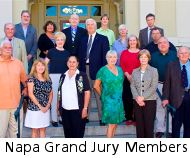



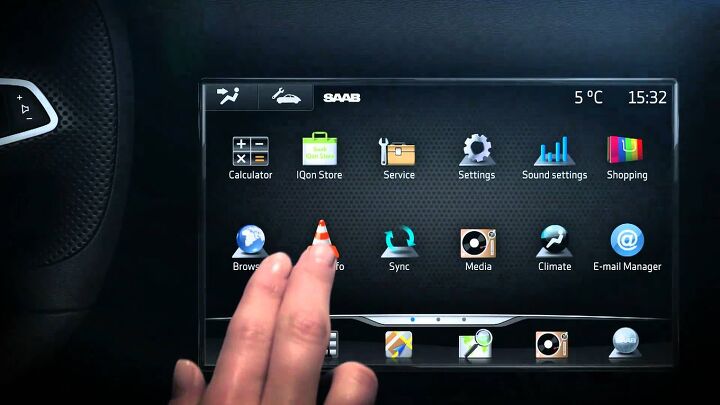
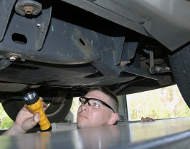




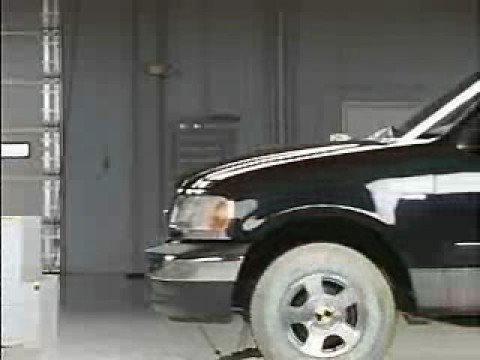

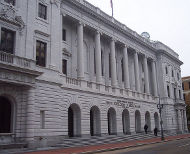












Recent Comments